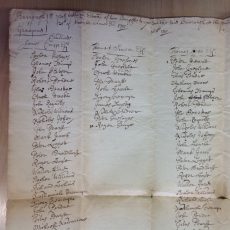May
1754
bristol
Contested
GENERAL ELECTION
Poll book data from:
Citation: The Bristol poll book… (Bristol: E. Farley, [1754])
Source: John Sims (ed.), A Handlist of British Parliamentary Poll Books (Leicester, 1984); Jeremy Gibson and Colin Rogers (eds.), Poll Books, 1696–1872: A Directory of Holdings in Great Britain (4th edn., Bury, 2008); L. W. L. Edwards (ed.), Catalogue of Directories and Poll Books in the Possession of the Society of Genealogists (4th edn., 1984).
Timeline & Key Statistics
Contexts & Remarks
Dates: Wednesday 17 Apr.-Wednesday 1 May 1754.
Poll book reference: The Bristol poll book... (Bristol: E. Farley, [1754]).
The poll book includes qualified Bristol residents who did not vote (described as 'neuter'), implying a total electorate of 4,992, of which only 254 did not vote (a 95 per cent turnout). However, this is likely to be an underestimate of the total electorate and does not include out-voters who did poll.
The incumbent MPs were both Tories on the brink of retirement. The Steadfast Society, which represented the Tory interest, and the Union Club, which represented the Whigs, attempted to nominate one candidate each for the 1754 election. However, the Steadfast Society rejected both Whig suggestions, Robert Nugent and Lord Barrington. The Union Club then independently nominated Nugent. In retaliation, the Steadfast Society nominated two Tory candidates.
Candidates: Robert Nugent (Whig); Richard Beckford (Tory); and Sir John Philipps (Tory).
Robert Nugent had previously served as MP for St Mawes in 1741, as well as Comptroller of the household to the Prince of Wales. Josiah Tucker, a supporter of Nugent, claimed: 'here was no one thing which contributed to the success of our cause so much as our continual insisting upon the ill-behaviour of the Tories in rejecting the compromise'.
Richard Beckford was a wealthy planter in Jamaica involved in the trade in enslaved peoples, with an estate of 9,242 acres. He ran in harnessin harness with Sir John Philipps, a country gentleman and Jacobite.
In an attempt to secure the election, the corporation passed a by-law to restrict the number of non-resident voters. Only the daughters of Bristol freemen who were resident in the city would thereafter be allowed to make their husbands voters. This resulted in an election address ?Äî The Dundry Petition: Or the Countryman's Humble Address to the Free-Women of Bristol (1754)?Äî that portrayed the bylaw as the first step in the removal of all female privileges (thus limiting the number of freemen voters). It charged the married 'Free-Women' of Bristol to pressure their husbands to restore the rights of non-resident free-women.
To secure the Whig interest in Bristol, the duke of Newcastle waded in to the fray, writing to George II: 'I humbly presume to acquaint your Majesty that Mr. Nugent and Mr. Hanbury, the great Quaker, came to me last night and told me that they had received an express from the Whigs at Bristol, who had directed Mr. Hanbury to engage to indemnify Mr. Nugent against all the expenses of his election, if he would immediately go down to Bristol, to the sum of £10,000' (BL Add. Ms. 32735, ff.48-49).
The election returned Nugent and Beckford.
Poll Book
Below is a digitised version of the poll book for this election:



